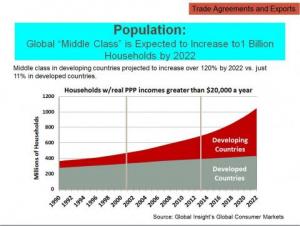Free trade contributes to broad-based economic growth and, for the United States, is essential in gaining market share among the rapidly expanding middle class in developing countries, Chief Agricultural Negotiator for the Office of the U.S. Trade Representative (USTR) Darci Vetter told U.S. Grains Council leaders during a speech outlining an ambitious U.S. trade agenda.
Growth in the Middle Class of Developing Countries
In her presentation, Vetter discussed where the major growth markets are expected to be in the near future. By 2018, the aggregate middle class population of the developing world will surpass that of the developed world. And the growth is explosive –by 2022, 616 million households in the developing world will have achieved middle class status, versus 432 million in the developed world. The balance of global purchasing power is shifting rapidly, and the emerging economies are demanding improved diets that drive trade of agriculture products.
Focusing on Free Trade Agreements
As global food demand increases, the United States strives to meet the growing needs around the world. To reach that goal, Vetter said, the United States must continue to promote expanded trade through trade agreements that help feed growing markets and give importers and end-users improved access to U.S. surpluses.
Vetter concluded by emphasizing the importance of the ongoing negotiations of the Trans-Pacific Partnership (TPP) and Transatlantic Trade and Investment Partnership (T-TIP).
The Council is actively engaged with industry consultative groups supporting high-quality, comprehensive TPP and T-TIP agreements. It also welcomes Vetter’s aggressive advocacy on these key issues in her new role at USTR.


